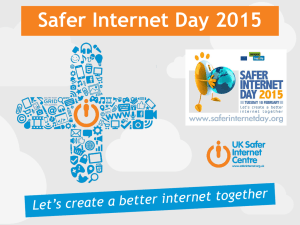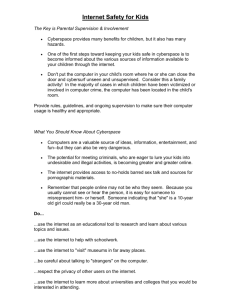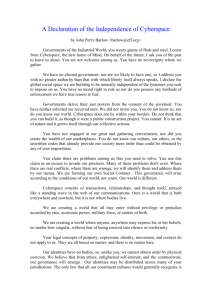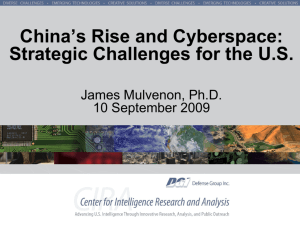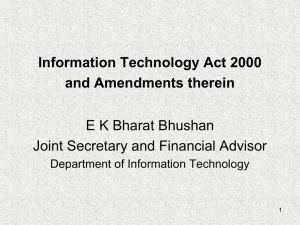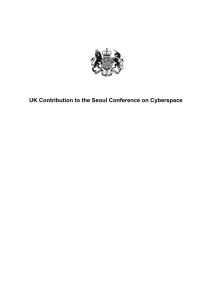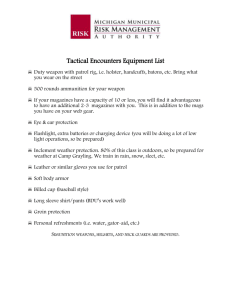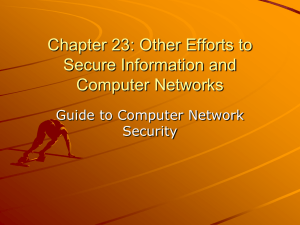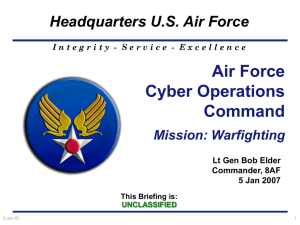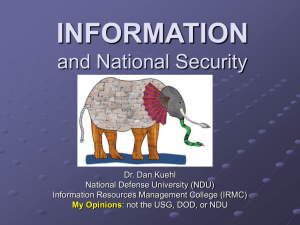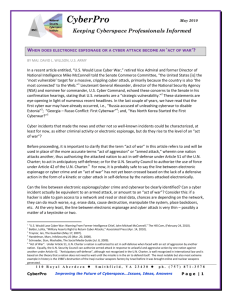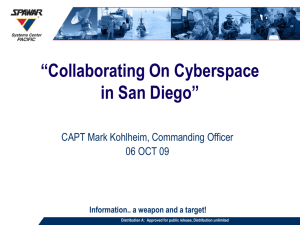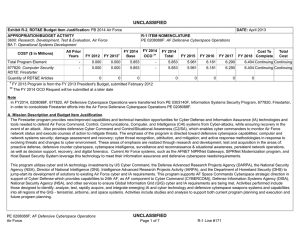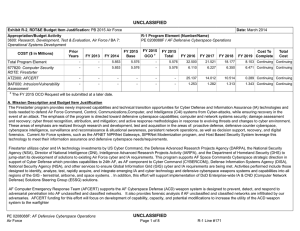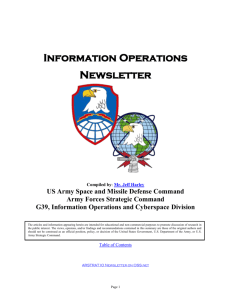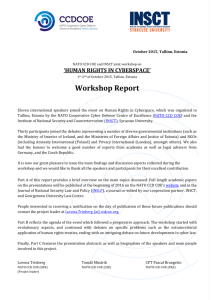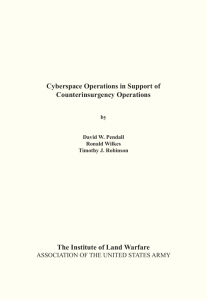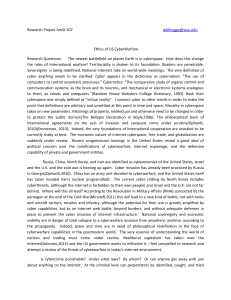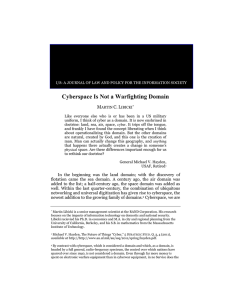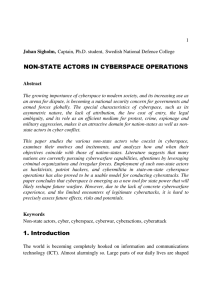You are going to read a magazine article about children using the
advertisement
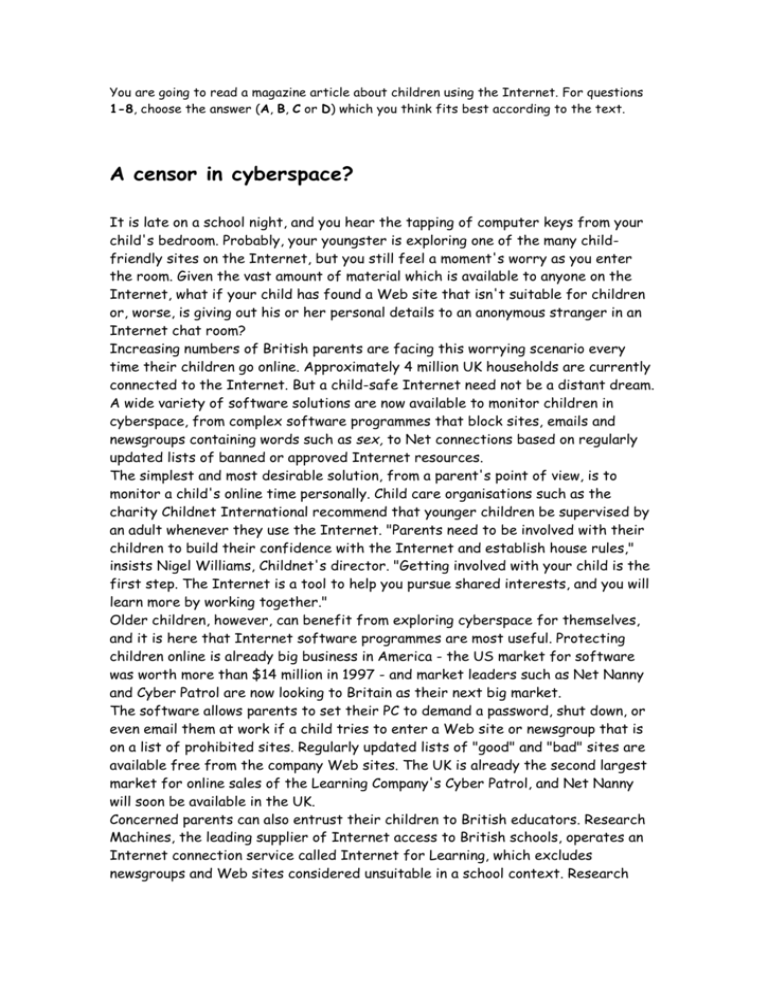
You are going to read a magazine article about children using the Internet. For questions 1-8, choose the answer (A, B, C or D) which you think fits best according to the text. A censor in cyberspace? It is late on a school night, and you hear the tapping of computer keys from your child's bedroom. Probably, your youngster is exploring one of the many childfriendly sites on the Internet, but you still feel a moment's worry as you enter the room. Given the vast amount of material which is available to anyone on the Internet, what if your child has found a Web site that isn't suitable for children or, worse, is giving out his or her personal details to an anonymous stranger in an Internet chat room? Increasing numbers of British parents are facing this worrying scenario every time their children go online. Approximately 4 million UK households are currently connected to the Internet. But a child-safe Internet need not be a distant dream. A wide variety of software solutions are now available to monitor children in cyberspace, from complex software programmes that block sites, emails and newsgroups containing words such as sex, to Net connections based on regularly updated lists of banned or approved Internet resources. The simplest and most desirable solution, from a parent's point of view, is to monitor a child's online time personally. Child care organisations such as the charity Childnet International recommend that younger children be supervised by an adult whenever they use the Internet. "Parents need to be involved with their children to build their confidence with the Internet and establish house rules," insists Nigel Williams, Childnet's director. "Getting involved with your child is the first step. The Internet is a tool to help you pursue shared interests, and you will learn more by working together." Older children, however, can benefit from exploring cyberspace for themselves, and it is here that Internet software programmes are most useful. Protecting children online is already big business in America - the US market for software was worth more than $14 million in 1997 - and market leaders such as Net Nanny and Cyber Patrol are now looking to Britain as their next big market. The software allows parents to set their PC to demand a password, shut down, or even email them at work if a child tries to enter a Web site or newsgroup that is on a list of prohibited sites. Regularly updated lists of "good" and "bad" sites are available free from the company Web sites. The UK is already the second largest market for online sales of the Learning Company's Cyber Patrol, and Net Nanny will soon be available in the UK. Concerned parents can also entrust their children to British educators. Research Machines, the leading supplier of Internet access to British schools, operates an Internet connection service called Internet for Learning, which excludes newsgroups and Web sites considered unsuitable in a school context. Research Machines preselect appropriate Internet resources which are then available for children to use at school. The service includes Web publishing software for children. It is widely agreed, however, that software solutions cannot replace parental supervision. "The computer should be in the family room," says Nigel Williams, of Childnet. "Kids have a natural curiosity but also need to learn a new set of rules to evaluate information on the Net so they know whether it is accurate or reliable. It is vital that parents help them to learn these rules." 1 Many parents are worried about their children A staying up late to surf the Internet. B using the Internet to chat with strangers. C spending too much time using the Internet. D not always using the Internet in appropriate ways. 2 Child-safe Internet is A impossible. B might be possible. C already available. D worrying. 3 Parents can use special software programmes to A control the amount of time children spend online. B stop children from writing certain words. C prevent access to parts of the Internet. D shut down inappropriate Web sites. 4 The most effective solution to the problem is A for children to join a child care organisation. B for parents and children to spend more time together. C for children to spend less time using the Internet. D for parents to supervise and control access to the Internet. 5 Cyber Patrol is A an American organisation which controls Internet access. B a software programme. C a company which monitors Internet use. D an organisation which helps older children to use the Internet. 6 Internet software is designed to A allow parents to control Internet use. B warn children about the content of Web sites. C stop children from switching on the computer at specific times. D send children emails. 7 Research Machines is an Internet service which A consists entirely of newsgroups. B limits access to the Internet. C allows schoolchildren to communicate with each other. D designs Web sites for schools. 8 In general, the writer argues that A the Internet will never be completely safe for children. B software is the most effective solution to the problem. C parents need to train their children to use the Internet effectively. D children will always find inappropriate material on the Internet.
